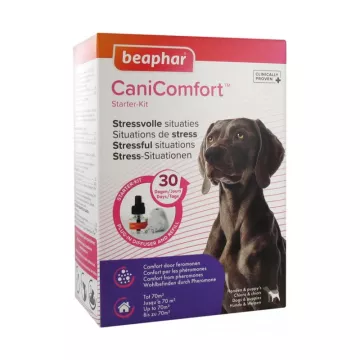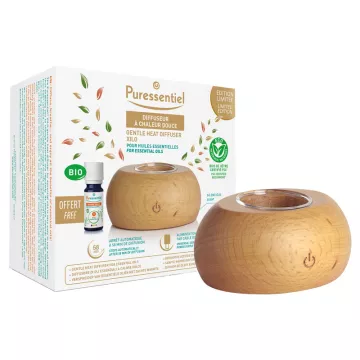Soin-et-nature respects your privacy Our site uses cookies to ensure that it functions properly and to optimise technical performance. For more information information and/or to change your preferences, click on the "Settings" button.


What is an essential oil diffuser and how does it work?
An essential oil diffuser is a device designed to disperse a fine mist containing essential oils into the air, in order to improve the quality of the indoor environment. There are several types of diffuser, including ultrasonic, nebulizer, evaporative and heat. The most popular, the ultrasonic diffuser, uses ultrasonic vibrations to transform a mixture of water and essential oils into vapor, which is then emitted into the air. These devices are used not only for their ability to scent a room, but also for their potential health and well-being benefits.
What are the main benefits of using an essential oil diffuser?
Essential oil diffusers offer multiple benefits. Improving air quality, reducing allergy symptoms, promoting sleep and increasing concentration are just some of the most significant benefits. They are also used to create a relaxing or stimulating atmosphere, depending on the oil used. Lavender, for example, is renowned for its relaxing properties, while lemon can help revitalize energy.
How to choose the best essential oil diffuser?
The choice of an essential oil diffuser should be guided by your specific needs and the space in which it will be used. For small rooms, an ultrasonic diffuser may suffice, while for larger spaces, a nebulizer, which doesn't dilute the oils with water, might be more effective. It's also important to consider ease of use, features offered such as timer settings and lighting options, as well as the product's build quality.
How to use an essential oil diffuser to maximize its benefits?
To maximize the benefits of an essential oil diffuser, it's crucial to follow a few basic practices:
Are there any precautions to be taken when using an essential oil diffuser?
Yes, it's important to take certain precautions when using an essential oil diffuser:
What's the difference between an essential oil diffuser and a humidifier?
Although essential oil diffusers and humidifiers may sometimes seem similar, they serve very different functions. A humidifier is primarily designed to add moisture to the air, which can help with dry skin, lips or nasal passages. An essential oil diffuser, on the other hand, is designed to disperse essential oils into the air, taking advantage of their aromas and therapeutic benefits. It's important not to use essential oils in a humidifier, as this could damage the device.
How many drops of essential oil should I put in a diffuser?
The amount of essential oil to use in a diffuser can vary according to the size of the room and the type of diffuser used. Generally speaking, for a standard ultrasonic diffuser in a medium-sized room, between 3 and 5 drops are recommended. For larger rooms, or for stronger effects, you can increase this quantity up to 10 drops. However, it is advisable to start with fewer drops and adjust according to preference and desired effect.
Can any type of essential oil be used in a diffuser?
Although most essential oils can be used in diffusers, some oils, because of their density or chemical composition, may not be ideal for all types of diffuser. For example, very thick oils such as patchouli or myrrh can clog ultrasonic diffusers. It's always best to check the diffuser manufacturer's instructions for specific recommendations, and opt for 100% pure essential oils to avoid malfunctions and maximize benefits.
Can essential oil diffusers help with respiratory problems?
Essential oil diffusers are often used to improve indoor air quality, which can benefit people suffering from respiratory disorders such as asthma or allergies. Oils such as eucalyptus, peppermint and rosemary are known to help clear the airways and ease breathing. However, it is crucial to consult a physician before using essential oils, especially in the presence of pre-existing medical conditions, as some oils can trigger allergic reactions or aggravate certain symptoms.
How do I maintain and clean an essential oil diffuser?
To ensure optimum performance and prolong the life of your diffuser, regular cleaning is essential. We recommend that you clean the diffuser after each use by draining any residual water and wiping the inside with a soft cloth. For a thorough cleaning, fill the tank with a solution of diluted white vinegar (10% vinegar) and run the diffuser for 5 minutes before rinsing and drying thoroughly. This process helps to remove oil residues and prevent the growth of mold and bacteria.